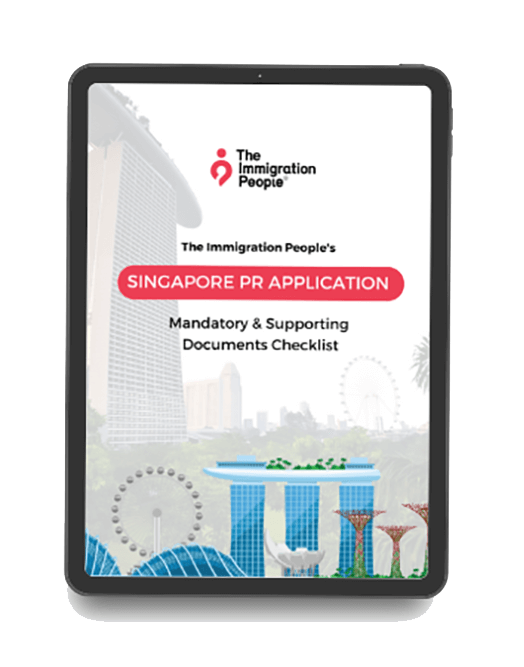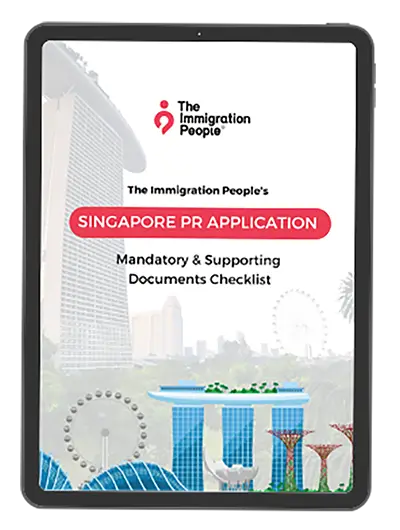The evolution of Singapore's Permanent Residency (PR) trends is a topic of great interest for prospective immigrants, current PR holders, and policymakers.
We explore how these trends might shape Singapore's PR landscape in the next 5 to 10 years.
Technology Integration in the PR Application Process
Technological innovation plays a significant role in shaping immigration processes worldwide. Singapore, known for its high-tech environment, is likely to leverage technology to further streamline and improve its permanent residence application process.
For instance, Canada's Express Entry System offers an efficient way for potential immigrants to submit their applications for permanent residency.
Predictably, we would see increased automation in the screening of PR applications. This might ultimately increase the speed of acceptance/rejection.
Perhaps system designs might involve, requiring appeal letters to go through a human vetter whilst all traditional PR applications are processed automatically.
Shifts in Demographics and Immigration Class
Much like other countries, Singapore's permanent residents' demographics might change over the next five years. Factors influencing this shift could include immigration policies, economic growth, and changes in labour force requirements.
With Singapore's focus on economic development, we might see a rise in the 'economic class' of permanent residents—professionals who contribute significantly to the country's economic growth.
With increasing quantity, it is also observed that the amount of high net-worth PR applications is increasing. It is not uncommon to see family offices in Singapore being set up for wealthy clients.
Increasing Immigration Targets
Following the trend of Canadian immigration (which has steadily increased its immigration targets over the years), Singapore might also raise its immigration levels.
This growth can potentially lead to an increase in the number of permanent residents in the country.
Though it remains to be seen which type of PR applicants would get their status approved.
Prioritizing Specific Skills and Talent
As Singapore continues its journey of economic transformation, there might be a more significant focus on attracting talent with specific skills. Especially those in booming sectors like technology, finance, and biomedical sciences.
Changes in Family Class Immigration
The upcoming years may also see changes in 'family class' immigration, which involves PRs or citizens sponsoring family members for immigration. Factors such as changes in the family sponsorship policy and the number of family-class immigrants could influence these trends.
This trend is perhaps a "rollover" from previous generations of PRs and naturalised citizens. Subsequently, as the world develops, this type of immigration might see a decline.
Worst-Case Scenarios: Potential Challenges

While we anticipate positive growth in Singapore's PR trends, it's essential to consider potential worst-case scenarios. These situations could affect the PR application process, permanent residents' experience, and Singapore's demographics.
Stricter Immigration Policies
The Singapore government may introduce stricter immigration policies due to various reasons such as political changes, economic factors, or public sentiment. A tightening of policies could mean higher requirements for PR applications, leading to a decrease in the approval rate.
Economic Downturn
An economic downturn could have a significant impact on PR trends. If Singapore faces an economic crisis, it may reduce immigration targets, especially in the 'economic class.' The job market could become more competitive, and current PRs might face job security issues.
Health Crises or Global Pandemics
Another worst-case scenario would be a pandemic. The ongoing COVID-19 pandemic has shown that such situations can lead to tightened borders, impacting immigration significantly. Health crises can affect both the PR application process and the experience of existing PRs.
Societal Resistance
There may be increasing societal resistance against higher immigration levels, leading to a more challenging environment for PRs. This could stem from concerns about job competition, changing societal demographics, or perceived threats to cultural identity.
Changing Global Immigration Trends
Changes in global immigration trends could also affect Singapore's PR landscape. For instance, if other countries introduce more appealing immigration programs, prospective PRs might choose to migrate elsewhere.
Conclusion
While we anticipate promising trends in Singapore's PR landscape, these potential worst-case scenarios underline the need for prospective immigrants and policymakers to consider a broad range of outcomes.
Being prepared for these challenges can help prospective PRs make more informed decisions and help Singapore adapt its policies effectively for potential future scenarios.
Frequently Asked Questions On Singapore PR Application For Spouse
Can an LTVP holder apply for Singapore PR?
The foreign spouse of a Singapore PR or citizen who is an LTVP holder can apply for Singapore PR under the sponsored scheme.
A married EP holder and LTVP holder couple can also apply for Singapore PR, with the EP holder being the main applicant.
ICA will evaluate each PR application fairly. Want to know your eligibility chances? Let us calculate for you: https://www.tip.com.sg/pr-application-e-preliminary-profile-analysis.html
What Is the Success Rate for Spouse PR Applications in Singapore?
The success rate for spouse PR applications in Singapore varies based on numerous factors, such as the applicant's qualifications, financial standing, and family ties. The ICA does not release specific success rates, as each application is assessed case by case.
Can My Spouse Work in Singapore While Waiting for The PR Application Outcome?
Your spouse can work in Singapore while waiting for the PR application outcome if they have a valid work pass, such as an Employment Pass or S Pass.
Does My Spouse Need to Be in Singapore During the Application Process?
No, your spouse does not need to be physically present in Singapore throughout the entire application process. However, if the ICA requires, they may need to be in Singapore for certain stages, such as submitting biometrics or attending an interview.
Can My Spouse's Children from A Previous Marriage Also Apply For PR?
Your spouse's children from a previous marriage can apply for PR if they have legal custody over them. You will need to provide custody documents in the PR application.
The ICA will assess their eligibility based on the child's age, relationship with the applicant, and financial support.
Can My Spouse Apply for Citizenship After Obtaining the PR Status?
Yes, after obtaining permanent residency status, your spouse can look forward to applying for Singapore Citizenship.
The selection criteria for a Singapore Citizenship application are much stricter.
They must meet minimum eligibility criteria, which typically include being a PR for at least two years and not losing the PR status due to a case of an expired Re-Entry Permit (REP).
But before considering citizenship status, we encourage keen applicants to ensure that they consistently demonstrate good character, have strong family ties, and are well financially.
Will My Spouse Need to Complete National Service If They Are PR Approved?
From our experience handling PR applications for adult male applicants (typically in their 30s and above) under Sponsored Spouse Scheme, they are generally exempted from the National Service as they are not suitable for full-time NS at that age and did not enjoy any benefits before their PR.
Under the Enlistment Act, all male Singapore Citizens and Permanent Residents, unless exempted*, must serve National Service (NS). NS-liable persons are required to register for NS upon reaching 16 and a half years old and will be scheduled for enlistment at the earliest opportunity upon reaching 18 years old.
Deferment from NS for university studies will not be granted regardless of whether such studies have begun. Those pursuing full-time GCE ‘A’ Level or Polytechnic Diploma studies (or equivalent) may be granted deferment if they meet the deferment conditions stipulated by the Ministry of Defence.
*All male applicants must access www.cmpb.gov.sg for information on NS deferment, the pre-enlistment process and Exit Permit requirements before proceeding with the application.
Can My Spouse Maintain Their Existing Citizenship After Obtaining Singapore PR?
Yes, your spouse can maintain their foreign citizenship after obtaining Singapore PR.
However, if your spouse later decides to apply for and is granted the Singapore citizenship status, they must renounce their original citizenship, as Singapore does not allow dual citizenship.
Does My Spouse Need a Job Offer in Singapore to Apply For PR?
No, a job offer is not a strict requirement for a Singapore permanent residency application under the sponsored scheme.
However, having a job or a job offer in Singapore can strengthen your spouse's PR application, demonstrating their ability to contribute to the local economy and support themselves and their family.



Social Integration and Humanitarian Aspects
Singapore might also put increased emphasis on the integration of permanent residents into its society, requiring potential PRs to demonstrate a robust understanding of Singaporean culture, norms, and customs.
The 'humanitarian class' of PR, while not as large as the economic or family classes, may also see some changes. This could be influenced by global trends and Singapore's commitment to international humanitarian efforts.